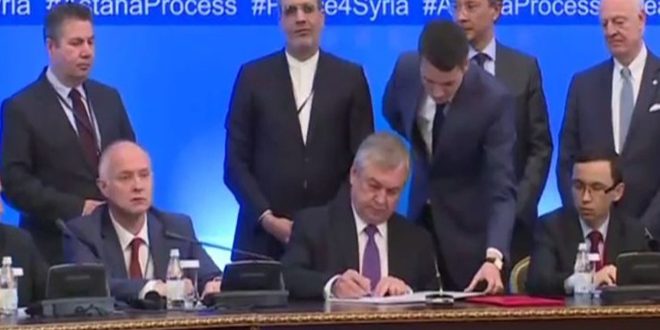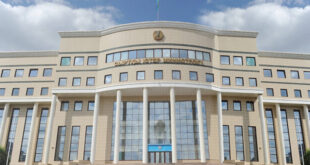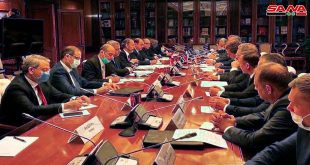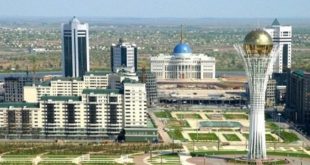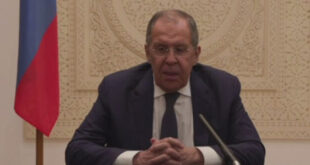Astana, SANA – The guarantor states of the cessation of hostilities agreement in Syria signed on Thursday the Russian memorandum on de-escalation zones.
The signing took place during the plenary session of the Astana 4 meeting held in Kazakh’s capital of Astana with the participation of the delegation of the Syrian Arab Republic headed by Bashar al-Jaafari and other delegations.
At the beginning of the plenary session, the Kazakh Minister of Foreign Affairs Kairat Abdrakhmanov said that on behalf of Iran, Russia and Turkey-the guarantor states of Astana process-the delegations of the three countries reaffirmed their commitment to the sovereignty, independence and territorial integrity of the Syrian Arab Republic and stressed that there is no military solution to the crisis in Syria which should be solved through a political process based on the implementation of the UN Security Council resolutions, particularly resolution no.2254 in its full form.
He added that the guarantor states have adopted a memorandum on easing tension in the Syrian Arab Republic, which seeks to create de-escalation areas from a point of view that is aimed at stopping the ongoing violence, improving the humanitarian situation and creating suitable conditions for reaching a political settlement of the crisis, in addition to combating terrorism in an effective way.
He pointed out that the guarantor countries said that all sides in Syria should take confidence-building measures and then contribute to a political settlement and a permanent ceasefire, adding that the participating delegations decided to hold another high-level meeting in Astana in mid-July.
Abdrakhmanov said the agreement reached in Astana contributes to easing the tension in Syria, stressing that the only solution to the crisis in Syria is the one that should be reached through dialogue.
He added that talks under the auspices of the United Nations are the only way to find a solution to the crisis in Syria, therefore, the Astana Platform and the talks in Geneva are interrelated and the influence of the three guarantor countries will also help, expecting that there will be important achievements in the ongoing negotiation process in this city.
Addressing a press conference at the end of the plenary session, al-Jaafari said he hopes that the Russian and Iranian friends will discuss the
details of the Russian memorandum on de-escalation zones with Damascus as soon as possible.
He added that Astana 4 was a qualitative leap in terms of the achievements reached, extending thanks to Kazakhstan, Russia and Iran for their efforts regarding “this big achievement” that will help stop the Syrian bloodshed and open the door for the political solution.
In turn, head of the Russian delegation to Astana meeting Alexander Lavrentyev told reporters that signing the memorandum on reduction-of-tension zones in Syria opens the door for allowing the preservation of Syria’s territorial integrity and achieving the political settlement.
Lavrentyev stressed that the guarantor states of the cessation of hostilities agreement in Syria agreed to the possibility of the participation of observers from other countries upon accord.
He noted that starting of the 6th of May, cessation of hostilities will be enforced in the four areas included in the memorandum.
UN Special Envoy for Syria Staffan de Mistura described the memorandum of understanding on de-escalation zones as a step in the right direction towards consolidating the cessation of hostilities.
Earlier, the delegation of the Syrian Arab Republic held talks with Kazakhstan’s Foreign Minister Kairat Abdrakhmanov prior to the plenary meeting.
M. al-Frieh/H. Said
 Syrian Arab News Agency S A N A
Syrian Arab News Agency S A N A
